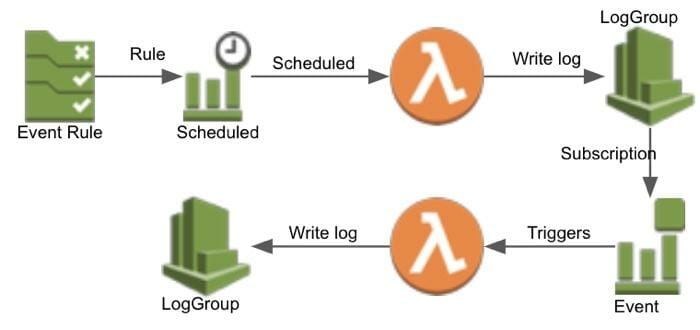AWS CloudWatch Logs (CW) is a service that among others, stores log files from AWS services in a central location. CW supports subscriptions that sends log events from CloudWatch logs and have it delivered to other services such as an Amazon Kinesis stream, Amazon Kinesis Data Firehose stream, or AWS Lambda for custom processing, analysis, or loading to other systems. To begin subscribing to log events, create the receiving source, such as AWS Lambda, where the events will be delivered. A subscription filter defines the filter pattern to use for filtering which log events get delivered to your AWS resource, as well as information about where to send matching log events to. In this blog we will setup a lambda subscription on a CloudWatch log.
Architecture
We will create the following application. A CloudWatch Event Rule will schedule an event to TriggerFunction. TriggerFunction writes a log message to CloudWatch logs. CloudWatchSubscriptionLambda is subscribed to the log of TriggerFunction. When there is a log entry, CloudWatchSubscriptionLambda gets invoked with the log line. CloudWatchSubscriptionLambda writes the received event to its log.

Scheduled Events
To schedule events to a Lambda we need the following configuration:
LambdaBasicExecutionRole:
Type: AWS::IAM::Role
Properties:
AssumeRolePolicyDocument:
Statement:
- Effect: Allow
Principal:
Service: lambda.amazonaws.com
Action: sts:AssumeRole
Condition: {}
Path: /
ManagedPolicyArns:
- arn:aws:iam::aws:policy/service-role/AWSLambdaBasicExecutionRole
TriggerFunction:
Type: AWS::Lambda::Function
Properties:
Handler: index.handler
Runtime: python3.6
Role: !GetAtt 'LambdaBasicExecutionRole.Arn'
MemorySize: 128
Timeout: 30
Code:
ZipFile: |-
def handler(event, ctx):
print(event)
TriggerFunctionLogGroup:
Type: AWS::Logs::LogGroup
Properties:
LogGroupName: !Sub '/aws/lambda/${TriggerFunction}'
RetentionInDays: 30
CloudWatchEventsRule:
Type: AWS::Events::Rule
Properties:
ScheduleExpression: rate(1 minute)
State: ENABLED
Targets:
- Arn: !GetAtt TriggerFunction.Arn
Id: scheduled-event
InvokeTriggerFunctionPermission:
Type: AWS::Lambda::Permission
Properties:
FunctionName: !GetAtt TriggerFunction.Arn
Action: lambda:InvokeFunction
Principal: events.amazonaws.com
SourceArn: !GetAtt CloudWatchEventsRule.Arn
CloudWatch Subscription
For the CloudWatch Lambda subscription we need the following configuration:
CloudWatchSubscriptionLambda:
Type: AWS::Lambda::Function
Properties:
Handler: index.handler
Runtime: python3.6
Role: !GetAtt 'LambdaBasicExecutionRole.Arn'
MemorySize: 128
Timeout: 30
Code:
ZipFile: |-
def handler(event, ctx):
print(event)
CloudWatchSubscriptionLambdaLogGroup:
Type: AWS::Logs::LogGroup
Properties:
LogGroupName: !Sub '/aws/lambda/${CloudWatchSubscriptionLambda}'
RetentionInDays: 30
CloudWatchLogSubscription:
Type: AWS::Logs::SubscriptionFilter
DependsOn: CloudWatchSubscriptionFunctionPermission
Properties:
DestinationArn: !GetAtt CloudWatchSubscriptionLambda.Arn
FilterPattern: ''
LogGroupName: !Ref TriggerFunctionLogGroup
CloudWatchSubscriptionFunctionPermission:
Type: AWS::Lambda::Permission
Properties:
FunctionName: !GetAtt CloudWatchSubscriptionLambda.Arn
Action: 'lambda:InvokeFunction'
Principal: 'logs.eu-west-1.amazonaws.com'
SourceArn: !GetAtt TriggerFunctionLogGroup.Arn
Raw Log Event
The log event that is received by the CloudWatchSubscriptionLambda has the following format. The log record is base64 encoded and compressed with gzip.
{"awslogs": {"data": "H4sIAAAAAAAAAIVRy27bMBD8FYPoMYSWFJ+6qa1tBIlbwFKbQ2oUlEQpBGRJpaS6RZB/z7oPoLdiL8vhYnZ25pmc/Ty7zpc/J08y8j4v86+HbVHk+y25IeNl8BFhxbgwqeVCaUC4H7t9HNcJfxJ3mZPenavGJRXiFN/U925eQj17F+sn2obon8bZUzfRMoau83G3DvUSxoGyWzgc3vLy0/HD3fE3c7FE785IzYGZhLGE2eTxzX1ebovyJHiTShCqraARjXOWs1ZVDUArGu10ihTzWs11DNOVfxf6xceZZI/k/+IC7S7U/3Dnqfe07se1ubgFR95d24dre4/q/mGnD9zsgB0+3u13lpx+qd9+98NyXfhMQoNHpEIA56A5CCxpjbESpJESLbUcuGFKM6YYgAapU2VNiqU5HrIEzGZBOSRjUnCFCfDUGnbzNzOkL8r8WG6O/tuKo7dNtmGmNRWTmvqaA2XMG1q1WlJoK6vrSijg9eYzeoL6s80fW78M5OX08grvTTW4DAIAAA=="}}
Processing Log Lines
The raw log event should be processed with a lambda:
import gzip
import json
from base64 import b64decode
def decompress(data) -> bytes:
return gzip.decompress(data)
def decode_record(data: dict) -> dict:
x = decompress(b64decode(data['data']))
return json.loads(x.decode('utf8'))
def decode_event(event: dict) -> dict:
return decode_record(event['awslogs'])
def handler(event, ctx) -> None:
print(json.dumps(decode_event(event)))
The log line after processing is the following:
{
"messageType": "DATA_MESSAGE",
"owner": "612483924670",
"logGroup": "/aws/lambda/blog-aws-elasticsearch-firehose-ap-TriggerFunction-1I0MMB2TURNKR",
"logStream": "2018/11/19/[$LATEST]42d35046fb0d4daa921f6bd00f4d7a73",
"subscriptionFilters": [
"blog-aws-elasticsearch-firehose-api-gw-example-cloudwatch-CloudWatchLogSubscription-W28F01MOKGF9"
],
"logEvents": [
{
"id": "34402224585553617062605662326569493632889831387406598144",
"timestamp": 1542649103395,
"message": "{'version': '0', 'id': '8d73f860-d1d1-d867-bb38-0093a2e3790d', 'detail-type': 'Scheduled Event', 'source': 'aws.events', 'account': '612483924670', 'time': '2018-11-19T17:37:38Z', 'region': 'eu-west-1', 'resources': ['arn:aws:events:eu-west-1:612483924670:rule/blog-aws-elasticsearch-fireho-CloudWatchEventsRule-127RVH0C949OJ'], 'detail': {}}\n"
},
{
"id": "34402224585575917807804192949711029351162479748912578561",
"timestamp": 1542649103396,
"message": "END RequestId: e9a9b88a-ec21-11e8-bc46-871711881058\n"
},
{
"id": "34402224585575917807804192949711029351162479748912578562",
"timestamp": 1542649103396,
"message": "REPORT RequestId: e9a9b88a-ec21-11e8-bc46-871711881058\tDuration: 1.19 ms\tBilled Duration: 100 ms \tMemory Size: 128 MB\tMax Memory Used: 21 MB\t\n"
}
]
}
Example
The example project shows how to setup the project. The example can be deployed with make create and removed with make delete.
Example with Private Network
To try out whether CloudWatch has access to the Lambdas when they have network connectivity with a private-subnet, I have created the following example project that deploys a VPC and places the Lambdas in the private subnet. I’m pleased to say that CloudWatch can still receive logs from a Lambda. Moreover, CloudWatch can still trigger the lambda that has been subscribed to a log, even if the Lambda has private network connectivity.
Conclusion
AWS CloudWatch Logs supports real time log processing by offering subscriptions. Supported destinations are Kinesis, Firehose, SNS and Lambda. In this blog we setup a lambda as a log subscription that decodes a lambda and writes the output to CloudWatch logs. We also configured a lambda that is triggered based on a schedule using CloudWatch events.




